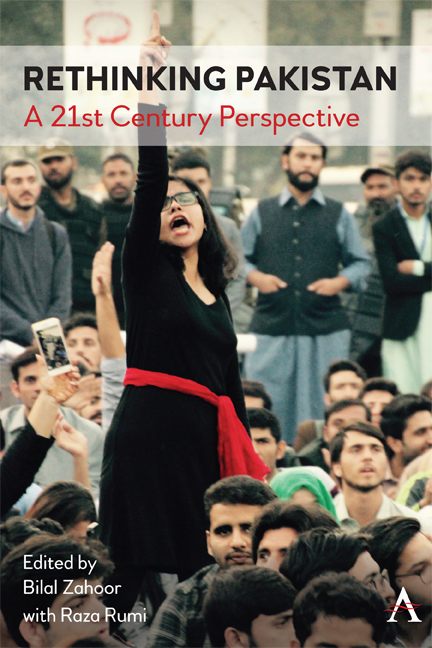Book contents
- Frontmatter
- Dedicated
- Contents
- Acknowledgements
- Introduction
- Part I Identity, Religion and Radicalisation
- Part II Development, Reform and Governance
- Part III Rights, Repression and Resistance
- Part IV Sex, Gender and Emancipation
- Part V Conflict, Diplomacy and Foreign Policy
- Contributors
- Bibliography
- Index
Pakistan: Towards New Beginnings
Published online by Cambridge University Press: 20 January 2022
- Frontmatter
- Dedicated
- Contents
- Acknowledgements
- Introduction
- Part I Identity, Religion and Radicalisation
- Part II Development, Reform and Governance
- Part III Rights, Repression and Resistance
- Part IV Sex, Gender and Emancipation
- Part V Conflict, Diplomacy and Foreign Policy
- Contributors
- Bibliography
- Index
Summary
Muhammad Hasan Askari, leading Urdu literary critic, wrote in an article in 1946 that “[Pakistan] would be the first populist and socialist state in the Indian subcontinent. As such, it would serve the interests not just of the Muslims but also of the Hindu masses, since it would assist in uprooting capitalism […] and in the establishment of a permanent peace and security.” While this might sound like a bloated expectation from a country created in the name of Islam, many of the prominent developments in the months preceding and following the Partition confirm the inevitability of this confusion. The economic proposal drawn up at the Karachi Muslim League in 1943 to set up a Planning Committee spoke vehemently of state-led industrialisation in the Pakistan areas, free primary education, land reforms, security of tenure to farmers and improvement in the social and economic condition of the proletariat. The manifestos of Punjab Muslim League (1944) and Bengal Muslim League (1945) were equally radical and contained similar promises, besides speaking of civil liberties, nationalisation of key industries and banks, strict enforcement of international conventions concerning labour, reduction in working hours and significant increase in minimum wage. Jinnah himself alluded to capitalism as a “vicious” and “wicked” system exploiting the poor masses, though he spoke rarely in economic terms.
While these developments might have led some to believe that an anti-capitalist state was in the making, this was not to be. Jinnah's opposition to Western-style capitalism emanated primarily from his commitment to the democratic principles of egalitarianism and social justice, rather than from socialism per se. And just as the radical manifestos of provincial leagues and Jinnah's anti-capitalism statements do not imply that he wanted a socialist Pakistan, the likelihood is that his consistent reference to Islam and intent to “take inspiration from the holy Quran” does not mean he envisioned a theocratic state either, however outweighing the “evidence” compared to the former is. One of the most credible scholarly voices suggesting the same idea is that of Muhammad Qasim Zaman, arguing that by sharī‘ah Jinnah only meant the “Muslim laws of personal status governing matters such as marriage, divorce, and inheritance” and not “ that the state should commit itself to Islamic law in its fullness”. Jinnah's own speeches around the Partition period validate the argument.
- Type
- Chapter
- Information
- Rethinking PakistanA 21st Century Perspective, pp. 3 - 10Publisher: Anthem PressPrint publication year: 2020



